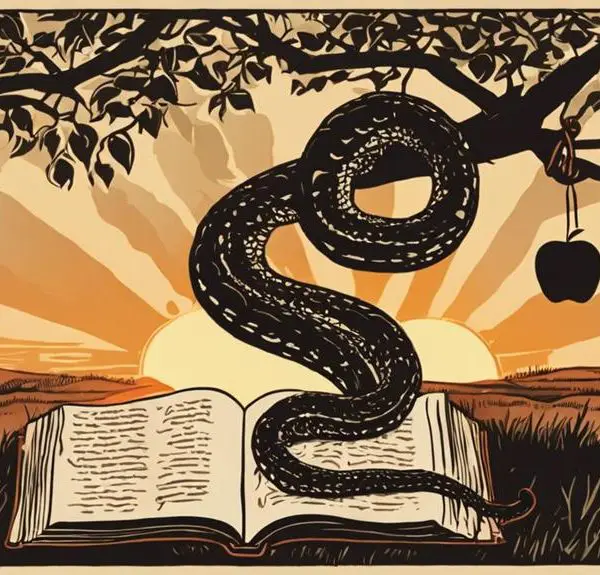Gain a deeper understanding of the term 'scornful' as used in the Bible and how it shapes the narrative and lessons within the sacred scriptures.

Please Define "Scornful" as Used in the Bible
You've probably come across the term 'scornful' in the Bible, a book that isn't shy about expressing contempt or derision. But what does it really mean in that context?
How does it shape the narrative, the lessons, and the overall message of the sacred scriptures? Let's pull back the curtain and explore this intriguing term, giving you a fresh perspective on the Biblical text.
There's more to it than meets the eye, so stick around and you might find your understanding deepened and enriched.
Key Takeaways
- 'Scornful', translated from the Hebrew 'Luts', carries a meaning of mockery and contempt in the Bible.
- Instances of 'scornful' in the Scriptures often depict it as a serious transgression and sign of disrespect towards God's word.
- Historical interpretations of 'scornful' have evolved from a religious sin to a character flaw indicating spiritual misalignment.
- In modern context, 'scornful' behavior leads to hostility and strains relationships, whereas practicing biblical teachings promotes unity and mental wellbeing.
Understanding Biblical Language

To fully grasp the depth of the term 'scornful' in the Bible, you'll need to delve into the intricacies of biblical language, a complex tapestry of idioms, metaphors, and cultural references. You must consider the parables in translation, as these often hold the key to understanding concepts that can be elusive in a direct translation. Parables aren't merely stories but rich reservoirs of moral, spiritual, and cultural knowledge. When studying scriptures, it's crucial to consider the historical context and cultural nuances that shaped the original text.
Symbolism, a vital element of biblical language, greatly impacts our understanding of terms like 'scornful'. Symbols in scriptures serve as a conduit, expressing abstract concepts and profound truths in a more tangible, relatable way. Yet, they can be easily misunderstood or misinterpreted without a strong foundation in biblical scholarship.
The term 'scornful' carries a weight of meaning that's not immediately apparent in a casual reading. It's steeped in cultural, moral, and spiritual implications. To appreciate its full meaning, you need to embrace the challenge of deciphering the rich, intricate layers of biblical language.
The Original Hebrew for 'Scornful

Delving into the original Hebrew language, you'll find that the word often translated as 'scornful' is 'Luts', a term imbued with significant semantic nuances. In Semitic linguistics, 'Luts' is a powerful word, carrying connotations of mockery, derision, and contempt, which resonate with the general understanding of scornfulness.
Further in-depth analysis of the 'scornful' etymology reveals that 'Luts' originated from a root verb meaning 'to mock' or 'to deride'. This is instructive as it further underscores the negative and derisive connotations attached to this term in the Biblical context.
Intriguingly, 'Luts' can also be interpreted as 'an interpreter', a person who 'mocks' by giving a false interpretation. This interpretation is fascinating as it expands our understanding of scornfulness – it isn't merely about derision but also about falsification and deception.
Instances of 'Scornful' in the Scriptures

You'll find numerous instances of the term 'scornful' throughout the Bible, each providing unique insights into its contextual and nuanced use. Analyzing these instances, you'll start to grasp the 'scornful' symbolism and its role in biblical parables.
Consider the following table, which charts five instances of 'scornful' in the Scriptures:
Reference |
Context |
|---|---|
Psalm 1:1 |
The Psalmist advises against sitting in the seat of the scornful. |
Proverbs 21:24 |
The term is used to describe a haughty mocker. |
Proverbs 29:8 |
It depicts people who stir up a city with their scornful nature. |
Isaiah 28:14 |
'Scornful' is used to describe rulers who mock God's word. |
2 Peter 3:3 |
Peter warns about scornful people in the last days. |
In each instance, 'scornful' embodies an attitude of contempt or derision, often directed towards God's law, wisdom, or His faithful servants. It's interesting to note that 'scornful' in parables often signifies an individual's moral and spiritual downfall, serving as a warning to others. These instances underscore the Bible's consistent message: scornful behavior is profoundly negative and leads to adverse consequences.
Historical Interpretations of 'Scornful

Over the centuries, interpretations of the term 'scornful' in biblical contexts have varied, reflecting changing cultural norms and theological perspectives. It's fascinating to delve into Scornful's cultural context, illuminating its historical significance.
In the early Church, 'scornful' was viewed as a grave sin, embodying a disdain for God's commandments. This interpretation was largely influenced by the socio-religious context, where respect for divine authority was paramount. You'll find that scorn was seen as a direct affront to this reverence, further shrouded in cultural implications of dishonor and disrespect.
Interestingly, Scornful's Greek translations provide additional depth to its historical interpretation. The term is translated as 'loidoros,' meaning 'reviler' or 'abuser.' This suggests a stronger, more aggressive connotation, emphasizing outright contempt and disrespect. Ancient Greek culture, with its emphasis on honor and status, would have viewed such behavior as exceptionally reproachable.
However, as theological perspectives evolved, so did interpretations of 'scornful.' The term began to be seen more in light of personal character flaws, less about societal norms. This shift reflects the growing emphasis on personal salvation and individual relationship with God. Thus, 'scornful' became a term of introspection, assessing one's spiritual alignment rather than societal standing.
Applying 'Scornful' in Modern Context

As we turn to the modern context, it's clear that the biblical term 'scornful' takes on new dimensions and applications in our contemporary society. This scornful behavior, marked by contempt or derision, can have severe consequences and a significant psychological impact.
Scornful Behavior Consequences |
The repercussions of scornful behavior can be detrimental. It can lead to strained relationships, hostility, and even isolation. The Bible warns against such behavior, as it breeds discord rather than fostering unity and understanding. |
Scornful's Psychological Impact |
The psychological impact of being scornful or on the receiving end of scorn can be profound. It can lead to feelings of worthlessness, depression, and a sense of rejection. |
Understanding these implications, it's crucial to refrain from scornful behavior. Instead, embrace the biblical teachings of respect, love, and kindness. Such actions foster a positive environment and mental wellbeing.
Frequently Asked Questions
How Is the Concept of 'Scornful' Applied in Other Religious Texts Apart From the Bible?
In other religious texts, 'scornful' carries similar connotations. For example, in Quranic texts, it's often linked to arrogance and mockery.
In Hindu scriptures, scornful depictions are usually associated with ignorance and disdain towards divine wisdom.
You'll find that in all these contexts, the scornful are viewed with disapproval, reflecting a universal religious sentiment against such behavior.
Are There Any Modern English Synonyms or Antonyms for the Biblical Term 'Scornful'?
You're asking about modern synonyms or antonyms for 'scornful' in the biblical context. Interpretation variations can affect this, but generally, 'scornful' is seen as derisive or contemptuous.
Synonyms might include 'mocking' or 'disdainful', while antonyms could be 'respectful' or 'reverent'. Understanding these can help in the contextualization of 'scornful' within the Bible.
How Does the Portrayal of 'Scornful' in the Bible Influence Societal Attitudes and Behaviors Today?
You're exploring how 'scornful's influence on ethics' is seen today.
The portrayal of 'scornful' in the Bible has shaped societal attitudes, encouraging respect and kindness.
It's even reflected in pop culture, with 'Biblical scornful' being cited in literature or films to condemn arrogance.
These instances remind you of the negative connotations of being scornful, influencing you to opt for humility and empathy in your interactions.
Are There Any Notable Figures in the Bible Who Were Specifically Described as 'Scornful'?
You're asking about biblical figures described as 'scornful'. Notably, the prophets often faced scornful judgments for their predictions. They were mocked, ridiculed, and often persecuted.
Their experience reminds us that being scornful isn't just about derision, but also a refusal to acknowledge truth. Thus, 'scornful' in the Bible is indicative of not only mockery but also ignorance and a resistance to divine wisdom.
How Does the Connotation of 'Scornful' in the Bible Compare With Its Connotation in Contemporary Language?
You're examining 'scornful'—its linguistic origins and biblical interpretations— and how it compares with contemporary usage.
In the Bible, 'scornful' typically means showing contempt or derision, often against God's law. Today, it still carries a negative connotation, suggesting disdain or mockery.
Yet, the depth of spiritual defiance implied in biblical usage may be lost. Hence, understanding the original biblical context can enrich your grasp of its modern application.
Conclusion
In conclusion, you've seen how 'scornful' in the Bible typically denotes a disdainful or contemptuous attitude. The original Hebrew word, 'luts,' provides further nuances to its meaning.
You've explored its usage in biblical contexts and historical interpretations. Now, you can apply this understanding in your modern context, recognizing when you or others exhibit 'scornful' behavior.
This deeper comprehension allows for a more profound engagement with biblical texts and personal introspection.



Sign up